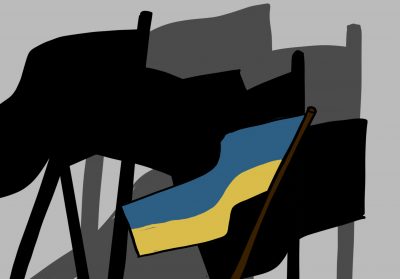Nothing encapsulates the uniqueness of our times better than the official Twitter account for the government of Ukraine tweeting a meme upon the occasion of the invasion of their country.
Sent in the early hours of the morning Thursday, the account tweeted a cartoon of Adolf Hitler embracing Vladimir Putin — almost as if he was a proud father of our century’s crazed authoritarian strongman.
Along with the image, the Ukrainian Twitter account said, “This is not a ‘meme,’ but our and your reality right now.
While it may seem awkward to someone not acquainted with the modern social media vernacular, this mode of communication is the best way for the government of Ukraine to relay their perilous moment.
The conflict, which began only a day ago, has already become the topic of non-stop internet memes — with people poking fun at seemingly third-rail topics.
But increasingly, it’s become the way that the world copes with all of the many insane global events taking place.
Whether or not this is the most sensitive or ethical way to respond to these serious issues is worth considering.
But it’s probably a better option, for many, than confronting the chilling reality of the conflict that is beginning to unfold in Ukraine. A conflict where, in just a day, the lives of 137 Ukrainians have already been lost.

This moment isn’t singular. It happens nearly every day in our modern times. Whether it’s a live-streamed attempt at insurrection in our nation’s capital or large-scale protests against police brutality coordinated on social media – the “history book” moments of today are live-streamed, memed and consumed 24/7 on social media.
The strangeness of these moments is only amplified by the medium in which we’re told about them. Witnessing the start of an invasion of a European nation in real-time on social media feeds instead of reading about it in history books is a jarring feeling.
When you learn about earth-shattering world events, it’s hard to understand what they felt like at the moment because you already know how they all end. World Wars, invasions and pandemics are delivered to us as parables, tied up neatly in a bow. There’s a clear ending, and you’re left with a feeling that the past is passed.
When you’re living in it, it’s impossible to use this same thinking. Nobody, not even the architects of these atrocities, can offer a guess worth anything as to how this conflict will end.
With no end in sight and no clues as to how the conflict will progress, it’s easy to go down rabbit holes of the worst potential outcomes.
It’s hard not to wonder if this event will become the new geopolitical paradigm where a country whose military resources vastly outnumber those of the nation it wishes to seize can march in without resistance. And what does that mean for the future of Taiwan?
China has long sought to claim Taiwan as its own. Even though it publicly insists that Taiwan is already part of China, internally, they know its independence is a danger to their dominance.
If Russia continues to face little to no resistance, sanctions from the West notwithstanding, for their actions — what’s stopping China from deciding to do the same?
It’s hard to see how a war fought on one side with tanks and missiles could be won by simply freezing bank accounts and placing sanctions. But the other option leads to an inevitable loss of life and a potential nuclear catastrophe.
With no way of knowing how this conflict will end, the immature and indecent internet memes and jokes now seem like the only way to truly cope with what’s happening. Because confronting uncertainty and the potential for global war is the much less appealing option.


















































































































